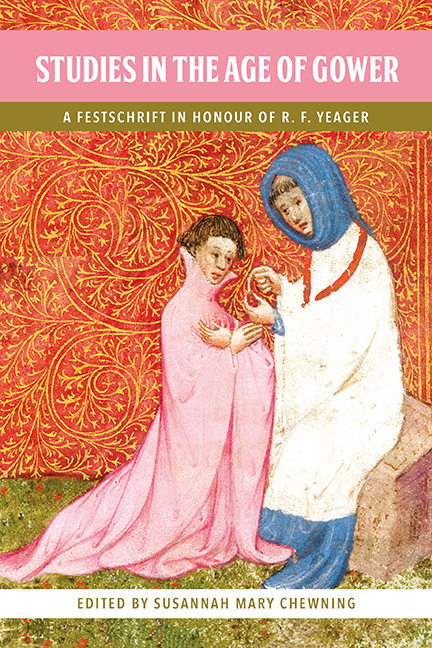Book contents
- Frontmatter
- Contents
- List of Illustrations
- Notes on Contributors
- Acknowledgements
- List of Abbreviations
- Introduction
- Part I Text
- Part II Gender
- Part III Time
- Part IV Spirit
- Part V Intersections
- A Personal Tribute to R.F. Yeager
- Bibliography of R.F. Yeager’s Writings
- General Bibliography
- Index
- Miscellaneous Endmatter
9 - Studies in Gower’s Age: Ciceronian Echoes in Confessio Amantis
Published online by Cambridge University Press: 28 April 2020
- Frontmatter
- Contents
- List of Illustrations
- Notes on Contributors
- Acknowledgements
- List of Abbreviations
- Introduction
- Part I Text
- Part II Gender
- Part III Time
- Part IV Spirit
- Part V Intersections
- A Personal Tribute to R.F. Yeager
- Bibliography of R.F. Yeager’s Writings
- General Bibliography
- Index
- Miscellaneous Endmatter
Summary
THE CONNECTION BETWEEN JOHN Gower's own age and the age of Amans in Confessio Amantis has long been a staple of Gower scholarship as the two have proven difficult to separate. The poet's merging of his own identity with that of Amans at the end of Book VIII of Confessio foregrounds old age as a critical subject for the Middle English poem, a focus echoed by many of Gower's own apparently autobiographical late Latin works. Indeed, from C.S. Lewis’ 1938 Allegory of Love to more recent reflections by David Carlson, Eve Salisbury, and Isabella Yeager, Gower's and Amans’ ages have been so well-discussed that one might wonder what more might be said. But, as R.F. Yeager has shown in the past few years, even the old topic of Gower's age can be made a topic of “newe som matiere,/ Essampled of these olde wyse,” that is, like Gower's Confessio, Yeager's recent work on Gower's age shows how new insights spring from old materials. In this essay, therefore, I want to sketch out how Yeager's contributions to Gower studies, in general, and studies of Gower's age, in particular, have both made definitive claims and, simultaneously, opened new vistas for reimagining what role old age has for the poet and his work.
Beyond the role that old age plays for authorial personae of the poet, and Gower's treatment of Amans, Gower's treatment of old age touches on politics and the virtues which make governance possible – and it is this connection which the “Trump of Death,” a short, little noticed narrative in Confessio, enlivens. Simultaneously, “Trump” offers some suggestions about the sources of Gower's thinking about old age and links Gower's handling of old age to Disability Studies and to the modern notion of the temporary fiction of the able body and critiques of “Ideology of Ability,” as voiced by Tobin Siebers. Linking the end of Confessio to the beginning books of the poem, “Trump” simultaneously connects Gower to Cicero and his De Senectute, an ethical tract extolling the virtues of old age and an apologia for its apparent vices.
- Type
- Chapter
- Information
- Studies in the Age of GowerA Festschrift in Honour of Robert F. Yeager, pp. 143 - 158Publisher: Boydell & BrewerPrint publication year: 2020

